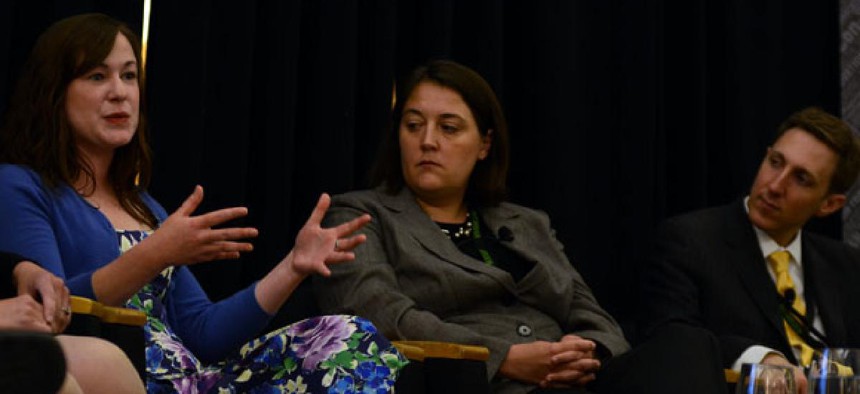
From left, Bridget Roddy, Erica Navarro and Brandon Friedman were part of the panel Monday. Caitlin Fairchild/Govexec.com
Young feds say bureaucracy, inefficiency keeping their peers away
Panelists attribute government’s lack of younger workers to a slow hiring process and poor communication.
Young people aren’t necessarily clamoring to work in the public sector these days, and the clues to why might be found by looking at those who have chosen a federal career path.
Emerging Leaders panelists during Monday’s Excellence in Government conference, presented by Government Executive Media Group, pointed to federal bureaucracy and a slowness to adapt to the changing workforce landscape as reasons young people could be reluctant to become government employees.
Brandon Friedman, director of online communications for the Veterans Affairs Department, pointed to the government’s inefficient hiring and firing speed as a primary turn-off for young people.
“It’s sort of inefficient by design. That’s the way the system was built,” Friedman said.
“Did anyone in here get a job just by applying randomly on USAJobs?” he asked. Two of the five panelists raised their hands. “OK, good. The system is not totally broken,” he said.
Older federal employees and senior executives have preconceived ideas about how young people interact that often are untrue, said Erica Navarro, director of Strategic Planning and Performance Management at the U.S. Agency for International Development.
“I do think that there is this overtendency to generalize [about young] folks and say they don’t want structure,” Navarro said, pointing to her own agency’s restructuring of physical office space as an example. “We just went through a space reconfiguration in my bureau where there are no cubes anymore and people hate it. The younger generation hates it.”
Communication barriers among agencies are another major hurdle to progress. Bridget Roddy, the program manager for the State Department’s Virtual Student Foreign Service, said she had been trying to share the details of a pilot program she had started at State with other agencies to discuss cross-implementation, but it wasn’t until she was interviewed for a Government Executive article that other departments reached out to her.
“An outside publication actually wrote about what we’re doing. Then other agencies took notice,” Roddy said.
Though some of the panelists said they had always envisioned themselves working for the government, others came over from the private sector, to their own surprise. Roddy had studied graphic design in college and did not anticipate a career in the federal service. Dave Uejio, the lead for talent acquisition at the Consumer Financial Protection Bureau, joined government from Silicon Valley, though he said he views his 10-month-old agency as a “startup.”
The private sector, particularly Silicon Valley, has displaced public service as the realm where America’s best and brightest want to see themselves, as outlined in a recent analysis by The Atlantic.
Friedman and Uejio both anticipate they will move on to the private sector at some point. In Uejio’s case, he said he would leave government if he finds that’s where his work will have the most impact. In Friedman’s case, he sees himself doing it anyway.
“It’s probably just my personality. I don’t think I can do something for more than a few years,” Friedman said, though he added he could see himself returning to the government years later with private sector experiences. He said the federal workplace has “a tendency to value experience over talent . . . One of the best ways to get ahead in government is to get old.”
And some who are sticking around say they aren’t being groomed properly. “In the United States today we no longer have this emphasis on training leaders,” said Jaqi Ross, associate director in the Internal Revenue Service recruitment office. She added, "I’ve seen a lot of the really instrumental leaders in the IRS move on after retiring or after a successful career."
Career ladder promotions, which have spiked by 75 percent over the past three years, are poison for retaining young, ambitious minds, according to Navarro.
“I think this idea that you get to sit in your current role for five to 10 years and then you get to progress to [Senior Executive Service] level, I just think it kills the government,” she said.
Clarification: This story has been updated to clarify remarks by Jaqi Ross on training leaders.






